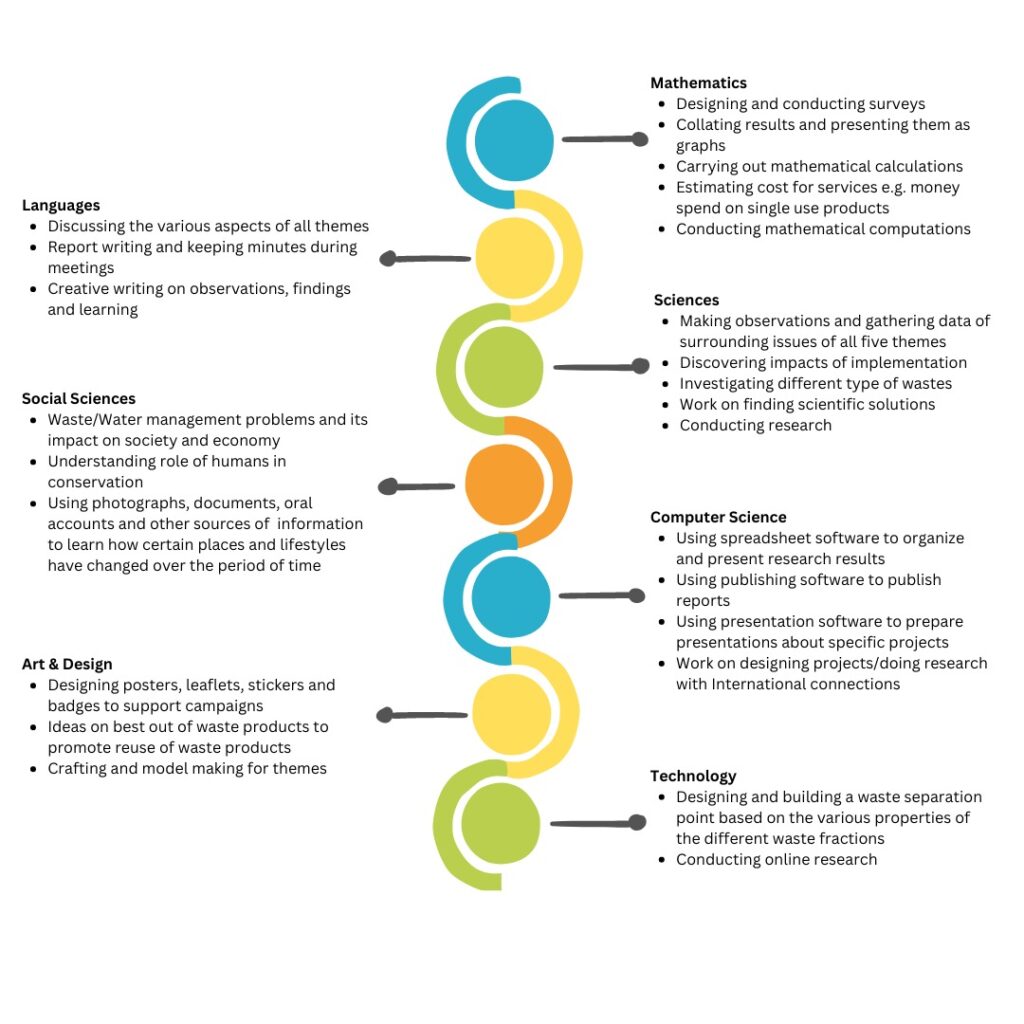|
Assessment Criteria
|
Indicator
|
Scoring
|
Points awarded
|
| Formation and Functioning of Eco-Schools Committee |
|
10 |
|
| Establishment |
Schools details including the process of formation and involvement of children-lessons in democracy |
|
|
| Diverse Representation |
Class, Gender, Different skills available with the committee due to diverse representation |
|
|
| No. of Meetings Arranged (To help understand how active is the committee of ESP) |
Minutes of meeting kept by students, follow-up actions in minutes of meetings, No. of Meetings arranged |
|
|
| Environmental Audit |
|
10 |
|
| Audit conducted for all thematic areas |
5 audits (Adequate)
4 or less (Not Adequate)
Not taken (Not Considerable)
*Linking to Climate Change |
|
|
| Develop an Action Plan |
|
20 |
|
Implementation of Action Plans in min. 3 Thematic Areas
Indicate by tick (√) which areas were the covered
| Biodiversity |
 |
| Energy |
 |
| Water |
 |
| Waste |
 |
| Healthy Living |
 |
| Link to Climate Change |
 |
| Number of activities undertaken per theme
Theme 1
Theme 2
Theme 3
Theme 4
Theme 5
|
|
- Develop an action plan based on audit results that has quantifiable targets and a timeframe Planning and prioritizing of activities to be implemented
- Most importantly planning and working on action based activities
- No. of students engaged and understanding of students to lead the programme
- Assessment of delivery of activities based on the outcomes as indicated in the approved action plan (Meeting the goals decided and timeframe mentioned)
- No. of activities undertaken bull; Positive outcome and skills development
- Min. requirements is 50% of students between classes 1 to 5 are covered as well as adopting the whole school approach while implementing
|
|
|
| Establish linkage with the School Curriculum (Most important) |
|
10 |
|
| Linkages of all activities to curriculum/all subjects |
- Environmental issues are already integrated in the curriculum of classes 1-5 across discipline
- The curriculum incorporates student experiences that should be inquiry-based and hands-on
|
|
|
| Inform and Involve |
|
20 |
|
| Showcasing and informing the work undertaken by students (frequency of engagement of other students/teachers/community)
Daily/Weekly/Once/Once in fortnight/Once a month/None
Feedback form from students/parents/stakeholders
How many of the people you reached while implementing this step inform and involve? (Give numbers and brief) |
- Frequency of communication
- No. of people/stakeholders connected with
- Feedback
|
|
|
Using different platforms to communicate about the progress of the Eco-Schools Programme
| Within School |
 |
|
|
|
|
(During school assembly/Displayed on notice board/through any days celebration/fair or actions taken)
| By engagement of parents |
 |
|
|
|
|
(Involvement of parents through action based activities at homes, schools, emails, circulars, workshop, sessions as well as through surveys)
| Involvement of Wider Community |
 |
|
|
|
|
(Local stakeholders/Social Media/Websites/Newsletters/School Magazines, etc.)
| Involvement of Wider Community |
 |
|
|
|
|
(Local stakeholders/Social Media/Websites/Newsletters/School Magazines, etc.)
| Informing other schools about this International Eco-Schools Programme and encourage them to join |
 |
|
|
|
|
|
- Evidence and keep record of impact created
- Reach out to wider community is most important step
|
|
|
| Monitor and Evaluate |
|
10 |
|
| To check whether you have reached to decided goals or designed action plans, school have to keep monitoring |
- The team will monitor and review the progress against timeframes and targets outlined in action plans
- Students are engaged in monitor and evaluation steps
- Data must be used in curriculum linkages
|
|
|
| Produce an Eco-charter/Eco-code |
|
10 |
|
Reflection of a statement that shows schools commitment to the sustainability
| Single location |
 |
|
|
|
|
| Multiple locations (two, four, more) |
 |
|
|
|
|
| None |
 |
|
|
|
|
|
- Understanding the importance of Eco-code and representation of it at various places to promote sustainability
|
|
|
| Presentation of Eco-Schools Portfolio (1-10) |
|
10 |
|
| Very Good |
 |
|
|
|
|
| Good |
 |
|
|
|
|
| Fairly Good |
 |
|
|
|
|
| Average |
 |
|
|
|
|
| Bad |
 |
|
|
|
|
|
- How sustainability has adapted through this programme in the academic year
|
|
|






